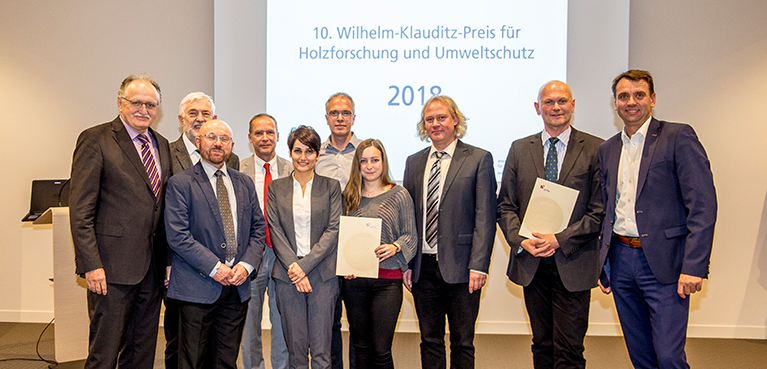Wilhelm-Klauditz-Prize for Wood Research and Environmental Protection 2018 - Award Ceremony
Braunschweig, 6th November 2018

Following the General Assembly of the International Association for Technical Issues Related to Wood (iVTH), Prof. Dr.-Ing. Bohumil Kasal from the Fraunhofer Institute for Wood Research gave the laudations. Due to a draw in the evaluation, the prize committee selected two works this year, both with a strong connection to environmental protection, and presented them with 5,000 euros each. The research work was elucidated by the award winners during two interesting presentations.
The reduction of dust emissions during woodworking and wood processing is an important topic in occupational safety and environmental protection. This topic is addressed by the first award-winning work “TriboWood: New process for the separation of small-sized dust, based on triboelectric charging”. The research project was performed by Dipl.-Ing. Roman Myna and Univ. Prof. Dipl.-Ing. Dr. Rupert Wimmer at the Institute of Wood Technology and Renewable Resources of the University of Natural Resources and Life Sciences in Vienna. The aim of the project TriboWood is the application of the triboelectric charging behavior of wood particles in a new technology for the reduction of small-sized wood dust in waste airflows. For the research into triboelectric effects on wood dust, a new experimental facility was designed and built. In the loading chamber of the facility, polymer rods were placed in such a way as to form a lattice and then tested as impact friction partners. In separately routed flow chambers, wood particles were charged with opposing poles and when the particle streams were combined, particle aggregation occurred, thereby improving the efficiency of the dust extraction (“fine dust to coarse dust”). Several prototypes have already been built. TriboWood can be integrated, as an additional device without any further electrical energy requirement, into the existing extraction systems of small and medium-sized woodworking companies. As a result, wood particulate pollution at the workplace is reduced which, in turn, contributes towards improved employee and environmental protection. As wood dust limits become increasingly stringent, this cost-effective new procedure can help to strengthen the competitiveness of small and medium-sized enterprises (SMEs) in the wood industry.
The other award-winning research work revolves around “the use of wood fiber-based oil binding agents to combat oil spills at sea” and thereby represents an important topic of environmental protection involving wood-fiber materials. Responsible for the project is the Chair for Wood and Fibre Material Technology at the Technical University of Dresden under the direction of Prof. Dr.-Ing. André Wagenführ. M.Sc. Javane Oktaee, Ms. Nina Niese, Dipl.-Ing. Holger Unbehaun and Dipl.-Ing. Sören Tech were significantly involved in the execution of the project.
Oil disasters at sea are often accompanied by unfavorable weather conditions or occur in marine areas which are difficult to access, whereby the application of existing oil-removal technology is difficult or even impossible. Within the framework of the “BioBind” joint project and a follow-up project, a system was developed for combatting oil spills which enables rapid oil removal even under unfavorable weather conditions and in shallow-water areas.
At the heart of this development are buoyant, wood fiber-based binding agents, which are equipped with oil-degrading microorganisms and which can be brought into place by airplane or ship and subsequently collected via net barriers or within the shore zone of the coast. The suitability of the patented oil binders and the new BioBind emergency system has been proven in laboratory and mesocosm tests as well as in several trials in the Baltic Sea. In a follow-up project, the production of the oil binders and their equipment was developed to industrial maturity. They form the core of an emergency system that is currently being implemented in the South Baltic region within the framework of the EU-funded joint project SBOIL together with partners from the Baltic Sea states. The aim of a planned follow-up project is to transfer BioBind technology to the Persian Gulf region, which is one of the most important oil-producing regions in the world. Here, the oil binders based on local agricultural by-products will be produced and used regionally in order to sustainably improve the environmental and living conditions in the affected regions.
Source: https://ivth.org/en/wk-prize_2018/

